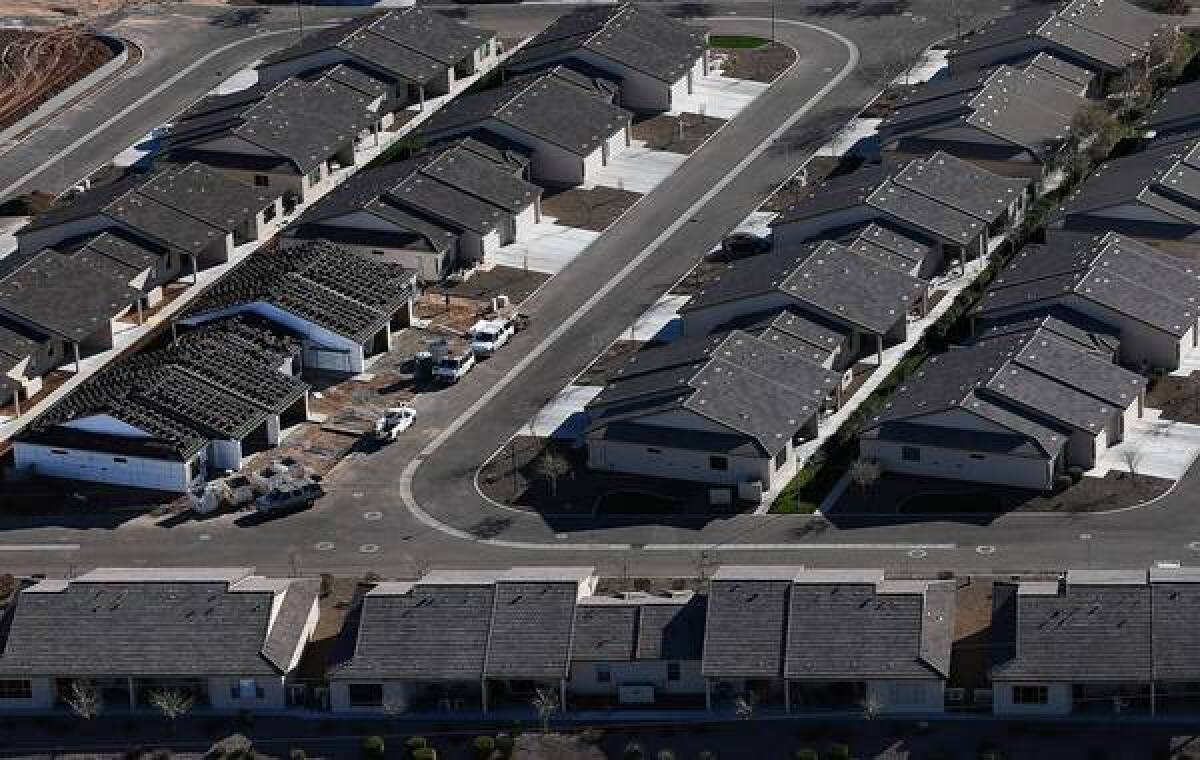FHA reports improvements in finances, but net worth still negative

- Share via
The Federal Housing Administration, fresh from a $1.7-billion bailout, now projects that it will replenish its financial reserves to required levels in 2015, two years faster than it had predicted a year ago.
The agency said its net worth remains in the red, by $1.3 billion, despite the recovering housing markets. But that is a $15-billion improvement from a year ago at FHA, which insures low down-payment mortgages and provided the only significant source of home loans for borrowers of modest means after the financial crisis.
The U.S. Department of Housing and Urban Development made the projections Friday in its annual report to Congress on FHA, saying its efforts to improve the agency’s finances were paying off.
The steps include raising insurance premiums and tightening credit requirements, making FHA loans less attractive to borrowers. The FHA also is lowering the maximum size of loans it insures in regions with expensive housing, such as California; the limits had been raised during the housing crisis.
QUIZ: How much do you know about mortgages?
The FHA is now “on a sustainable path to fulfill its dual mission of supporting access to homeownership for underserved and low-wealth borrowers as well as supporting and stabilizing the housing market,” HUD Secretary Shaun Donovan said.
The FHA had been self-funded throughout its 79-year history until it tapped the U.S. Treasury on Sept. 30 to cover potential losses. It had greatly increased its role in the housing markets after the subprime mortgage meltdown -- and suffered large losses as a result.
Republicans kept up their criticism of the agency, noting that its projections have in the past proved far off the mark.
Until this year, the Obama administration played down the possibility that FHA would need to turn to the Treasury for help. Finally this spring, the administration disclosed that the agency would, indeed, need a bailout but estimated the cost at $943 million, far below the ultimate tab.
“Today’s news confirms what advocates of FHA reform have known for years -- that a broke FHA is a broken FHA,” said U.S. Rep. Jeb Hensarling, the Texas Republican who heads the House Financial Services Committee.
“It’s been barely two months since hardworking taxpayers were forced to bail out the FHA with $1.7 billion, and we’re already faced with the prospect of another bailout for the FHA next year,” Hensarling said in a statement.
The ranking Democrat on the committee, Maxine Waters of Los Angeles, said the FHA is “not completely out of the woods” but expressed optimism about its prospects for regaining a solid financial base.
“Today’s numbers show crucial improvements in its solvency and stability,” Waters said. “We must remember that during the worst of the crisis, when the private sector virtually fled the struggling market, FHA provided the liquidity that helped restore confidence.”
The shortfall at the FHA is in the capital reserves that it is required to maintain against potential losses in the future. It said it has $48 billion in liquid assets on hand to handle claims in the short term.
Two other pillars of housing finance, Fannie Mae and Freddie Mac, have also seen their finances improve dramatically as the housing recovery continues. The companies, near bankruptcy in 2008 because of the collapse of the subprime housing bubble, are now profitable.
Fannie and Freddie received about $187.5 billion in bailout money but have needed none since early 2012. The bailout requires them to pay dividends on the money, and by the end of the year they will have paid the government about $185.3 billion.
More to Read
Inside the business of entertainment
The Wide Shot brings you news, analysis and insights on everything from streaming wars to production — and what it all means for the future.
You may occasionally receive promotional content from the Los Angeles Times.











